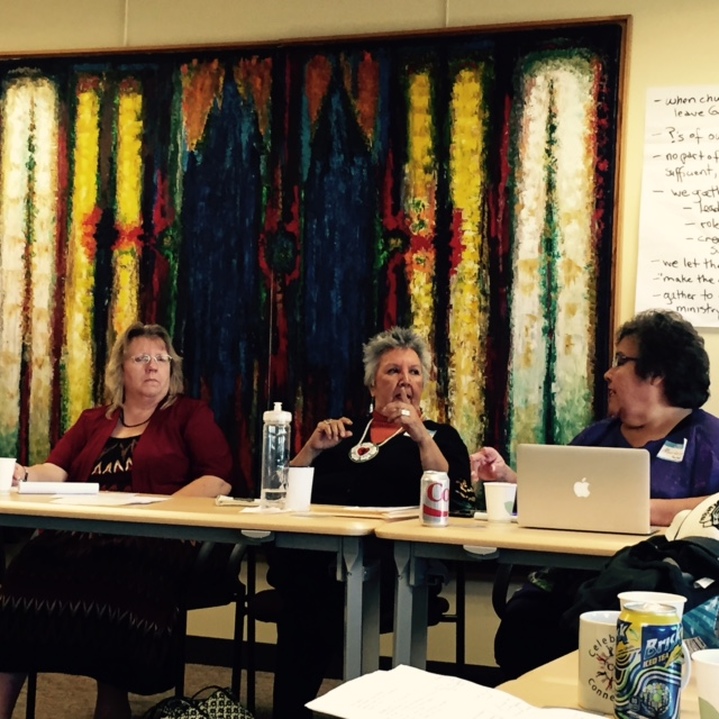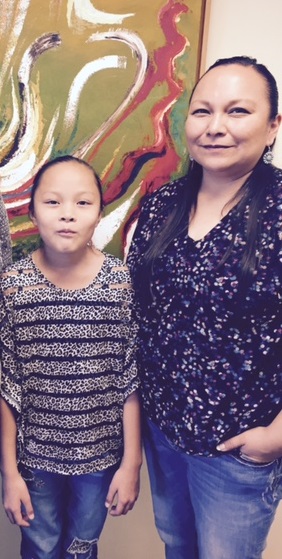 As I write this, I am in Chicago, meeting with the ELCA's Native Ministry Team. George Karres is with me, as is Loni Whitford Taylor, president of Our Saviour's, Rocky Boy. We are discussing "The Doctrine of Discovery," and the movement towards a Churchwide Assembly memorial to repudiate the doctrine, as a way to work on our healing and reconciliation with native peoples. I want to share with you a piece that I was requested to write on the Doctrine of Discovery: I have been asked, along with my colleague, Bishop Guy Erwin, to reflect on the Repudiation of the Doctrine of Discovery. We are both Bishops of the Evangelical Lutheran Church in America. But he is an enrolled tribal member, and, I, despite a family history that claims a drop of native blood from colonial days, am non-Indian. But I serve in a state with 7 reservations and 10 tribes. In 2010 our Synod adopted a formal Apology to the Native people who are our neighbors. So what does a non-Indian Bishop have to say about the Doctrine of Discovery? My first temptation is to distance myself from it. Its formal origins are, after all, a papal bull, and as a Lutheran I am not held accountable for what a Pope has said. After all, we left Rome, didn’t we? But to try to get off the hook by claiming I wasn't there, that I didn't have anything to do with it would be the same as trying to claim that because some of my ancestors were abolitionists that I have no accountability for the legacy of slavery. So I have to confess that as a European-American, I have benefited from the Doctrine of Discovery, as articulated first by the Catholic Church, and then by the United States Supreme Court. Confession is our liturgical starting place, and it is my starting place as I contemplate the Doctrine of Discovery. In the 15th century, when Europeans began their voyages of discovery, Christianity was synonymous with European culture and its understanding of God’s will for creation. Europeans set out for places unknown to them much as they had set out centuries earlier for Palestine, armed with what they saw as the truth-which was often boiled down into “We are right and everybody else is wrong.” Europeans came to the Americas convinced that because the lands were uninhabited by Christians, they were entitled to claim the land for themselves and their monarchs. And they did. And because there were already people living in those lands, the Europeans had to come up with a way to explain them away. So it was decided that the people already living on the land were less than human, just as the slaves brought from Africa later on were classified. This classification of some people being worth less than others pertained to women, although in a different way. From the taking of land--by force or by deceit-to the imposition of alien cultural values, European-Americans have committed cultural genocide against the indigenous peoples of the Americas (and elsewhere), and the Christian church has been complicit. There is a particularly insidious version of bad theology that raised its ugly head in the latter part of the 20th century. The sanitized version is called “ The Prosperity Gospel.” The more descriptive one is “Name it and Claim It.” If we are honest, that is what happened as the Europeans invaded the Americas.
The vast majority of non-Native Americans today have no idea of the treaties made and broken, the way of life destroyed, and the near-genocide of the peoples who originally lived on this land that we now call the United States of America. And they have no idea of the role that Christianity played in this terrible tragedy. It is for this role in the systematic degradation of the indigenous people of the Americas that we as contemporary Christians need to repent. We need to repent our arrogance. We need to repent the arrogance of our ancestors for thinking that God created them more lovingly than God’s other children, and we need to repent our arrogance in allowing that false assumption to continue. We need to repent our theological arrogance that has allowed us to justify our mistreatment of God’s beloved people and the misappropriation on their land and their lives as a right rather than a wrong, as a gift rather than as a crime. We need to repent our cultural arrogance. We need to repent the cultural arrogance of our ancestors that enabled them to take children away from their parents to “civilize” them, to prohibit the use of native language and religion, and to destroy a people’s government and economy and way of life. And we need to repent of our present day cultural arrogance that assumes that, despite past damage done, native peoples are “better off” for having had the Europeans invade, in the long run. We need to repent our greed. We need to repent the greed of our ancestors who came to the Americas seeking wealth and power at the expense of justice. We need to repent our own complacency in allowing the legacy of injustice persist. Every time a treaty is broken, a lawsuit is lost, a holy site is defiled, we are complicit in the ongoing injustice. We need to repent our blindness. We need to repent our inability and our willingness to see that all God’s children are equally beloved by God, and are equally precious. We need to repent our blindness about the extent of the damage European-Americans have done to the land, to the culture and to the people who were in the Americas long before the Europeans. The pattern of conquest is not without biblical precedent. You only have to go to the Pentateuch to read of the conquest of Canaan, and the overthrow of the inhabitants. Indeed, the early European settlers in North America saw themselves as entering into a new “Promised Land.” We have to own that. And we have to own that not everything in the Bible is meant for us to re-enact. The World Council of Churches said, in 2012 that it: “Calls on each WCC member church to reflect upon its own national and church history and to encourage all member parishes and congregations to seek a greater understanding of the issues facing Indigenous Peoples in their ongoing efforts to exercise their inherent sovereignty and fundamental human rights, to continue to raise awareness about the issues facing Indigenous Peoples and to develop advocacy campaigns to support the rights, aspirations and needs of Indigenous Peoples.” Repudiation of the Doctrine of Discovery, for non-indigenous Christian people, starts with repentance. We confess our sin against God and neighbors, and we ask for forgiveness. Convinced that Christ died and rose for all people, we ask for forgiveness. And respecting cultural differences, we do not demand it. We simply offer repentance and seek forgiveness. Convinced that God is reconciling the whole world to Godself through Christ, we seek reconciliation with our neighbor. We hope against hope, believing that with God all things are possible, including our own repentance, reconciliation and conversion. In 2010, the Montana Synod adopted the following Apology to Indigenous Tribal People: “Recognizing the long history of injustice towards the Indigenous Tribal peoples of the United States, we the Montana Synod of the Evangelical Lutheran Church in America express our profound sorrow and repentance for the grief and pain suffered in the past and in the present. For too long we have remained silent, ignored the violence perpetrated against the Tribes, ignored the violation of Treaties, and ignored the tragic aftermath that haunts the original peoples of the land. We ask for forgiveness, forgiveness for what we have done, and what we have failed to do. As a sign of our repentance and a desire to be reconciled, we pledge to walk with our brothers and sisters of the Tribal Nations. We offer our support for the honoring of treaty rights, the healing of lives torn asunder by forced cultural changes, loss of language, racism and poverty. We will stand with the Tribes in honoring the sacred sites and ceremonies. Let it be known to all the Tribes that our door is open to you and we are here to listen and to work for a better tomorrow for all the Creator’s people.” I offer these thoughts as a non-native Bishop, with humility and respect, and gratitude at being invited into the conversation. In Christ, Jessica Crist, Bishop
8 Comments
Virginia Oraw
10/11/2015 08:40:49 pm
Thank you for keeping this dialogue going, it is long overdue.
Reply
Rosemarie Doucette
10/12/2015 09:40:35 am
Thank you for the work you have done and for exposing the uncomfortable, ugly, but nevertheless ever-present side of US history. May each of our congregations speak confessionally about this, and continue your efforts to promote peace and healing.
Reply
Dale Loepp
10/12/2015 10:12:00 am
This is fantastic! The only thing I would add is that this is also bound up in the Renaissance notion of the revival of empire. We may have left Rome behind but we are still very much part of and have benefitted from an imperial world.
Reply
Gretchen Wagner
10/12/2015 08:36:12 pm
Thank you for our delegation's participation in this important work. I have wanted to share this with my congregations and I just did!
Reply
Anthony Caputo
10/13/2015 10:56:57 am
I' m not a religious guy, or a well educated guy. Brought up during the 40's and 50's, many movies were about cowboys and Indians. They all had one theme, the Indians were the bad guys. Not being taught different, I believed that. Than later in life I started to think a little differently and developed a conchinse. When I read or hear that we are sending billions of American dollars from our government and many individual benefactors to other countries, I think about some of our native Americans who live in scualer. After all the awful things we've done to them, don't you think that money would be better spent here, not just native Americans, there are many other Americans starving out there. So what if some native American own casinos, my mother used to pay the numbers every day when the bookie came around. Where did that money go. God will bless us for what we have, not what we have taken.
Reply
Anthony Caputo
10/13/2015 11:00:50 am
Reply
Sherry James
3/9/2017 11:20:28 am
Excellent article. I hope all is well with you and your family!
Reply
Leave a Reply. |
Bishop Jessica Crist
Bishop of the Montana Synod of the ELCA Archives
August 2019
Categories |
